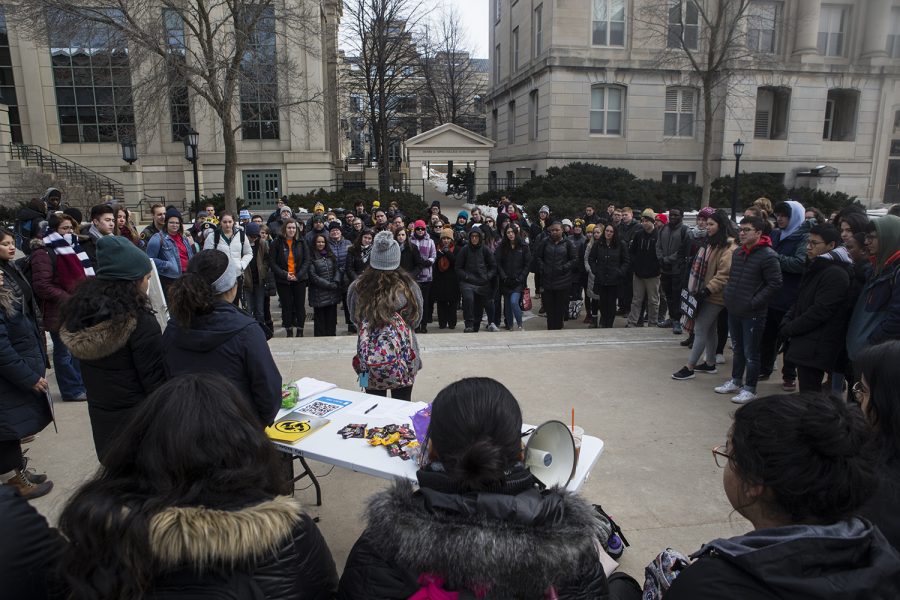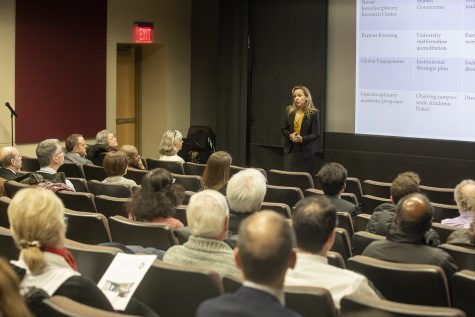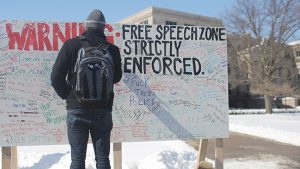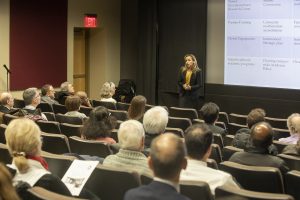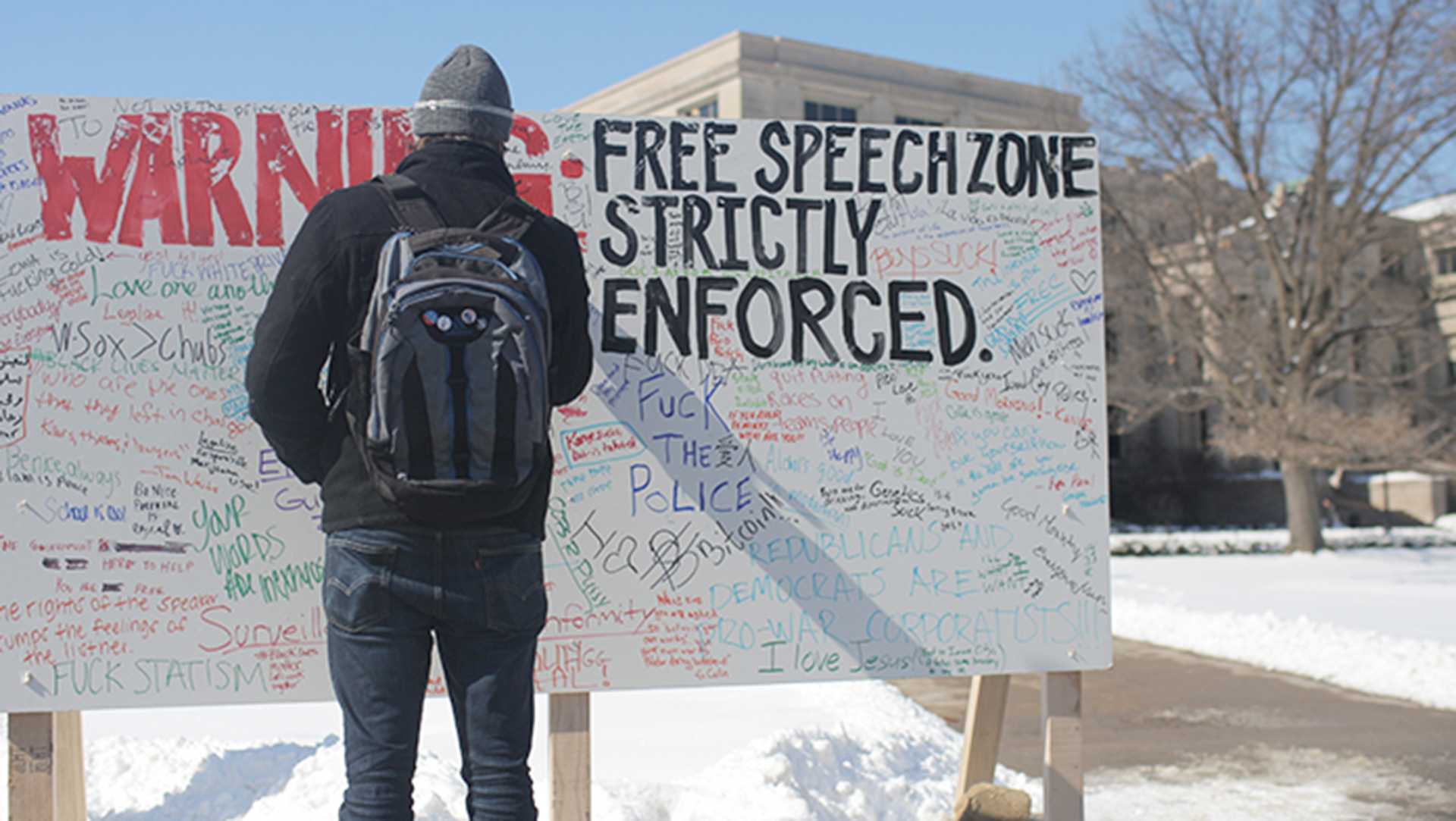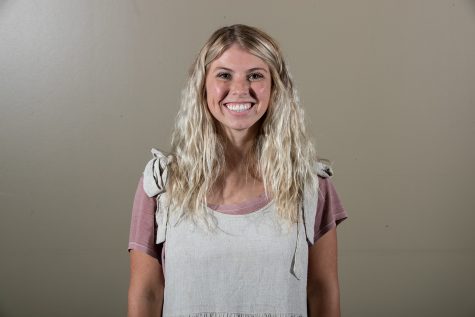Newby: How we have conversations shapes our communities
The way we talk about issues and injustices, whether we are speaking gently or harshly, has the ability to shape the entire conversation unraveling before us — bringing smaller communities closer together or separating them even further.
A student speaks during a rally for the #DoesUIowaLoveMe movement in the T. Anne Cleary Walkway on Thursday, February 28, 2019. Students, university faculty, and community members gathered to tell their stories about belonging to marginalized cultural groups. Does UIowa Love Me is a collective of students that aims to give underrepresented students an outlet to share their experiences as people of color at a predominantly white institution.
March 6, 2019
There is a lot of chatter on campus around social movements, political agendas, and the occasional push for religion. There are signs and banners cluttered with offensive language scattered across the T. Anne Cleary Walkway — promoting split sides and edged arguments.
And as a columnist, student, and member of a faith-based organization, I have access to a front-row seat when it comes to the way we navigate these controversial conversations that continue overwhelming our campus.
Lera Boroditsky, an associate professor of cognitive science at the University of California-San Diego and editor-in-chief of Frontiers in Cultural Psychology, studies the relationship between how the mind responds to the way language takes form.
RELATED: Students share #DoesUIowaLoveMe stories at rally
“The language guides our reasoning about events,” Boroditsky said in her TED Talk.
Using this as an “example of how language can shape things that have personal weight to us — ideas like blame and punishment or eyewitness memory.” And stating that “these are important things in our daily lives.”
The way we talk about conflict or guide discussion around divisive political views or brokenness that exists in the justice system can offer others an invitation to join in and pursue change. Or it can keep people apart — rather than allowing them the opportunity to participate in conversation together.
#DoesUIowaLoveMe, a hash-tag used by students to rally and share their experiences of heartbreak, surged through social media just last week. And what I saw from each student — aside from their willingness to share — was another student’s or faculty member’s willingness to lean in and listen.
The way we talk about issues and injustices, whether we are speaking gently or harshly, has the ability to shape the entire conversation unraveling before us — bringing smaller communities closer together or separating them even further.
RELATED: Shaw: #DoesUIowaLoveMe? Maybe not, but there’s hope for a future where it does
Subjects such as sexual assault and harassment, victim-blaming and victim-shaming, the push for people with felonies to have their voting rights restored, the conversation about discrimination, and the many more sensitive subjects each deserve to be spoken about with understanding and compassion.
And if we want to seek change in a system so set in its rhythms of discrimination and confusion, or if we want to see different people in different political positions, it’s time we began talking with one another rather than at one another.
The waves of wondering, asking, and discerning these debates arise in discussion among different communities on campus. And often, disband people in wake of such heavy-hearted conversation. Because it’s hard to be honest, and it’s hard to actively extend understanding.
When we become a more compassionate people, our community sees benefit — and so do we, in our everyday lives.
RELATED: Neal: Will a hashtag make the UI love us?
“Research on compassion interventions show improvements in psychological well-being, compassion, and social connection,” according to the Association for Psychological Science website.
But despite the level of effort that would be required of us to exalt in attempting to soften our speech and become better listeners, I think it’d be helpful if we consciously humanized our language.
The point of confronting conflict in the media spotlight, around campus and in our own smaller communities, can either band us together or break us apart. And I think it’s more than important that we do whatever it takes to come close together in order to see change spread throughout our University of Iowa community.



